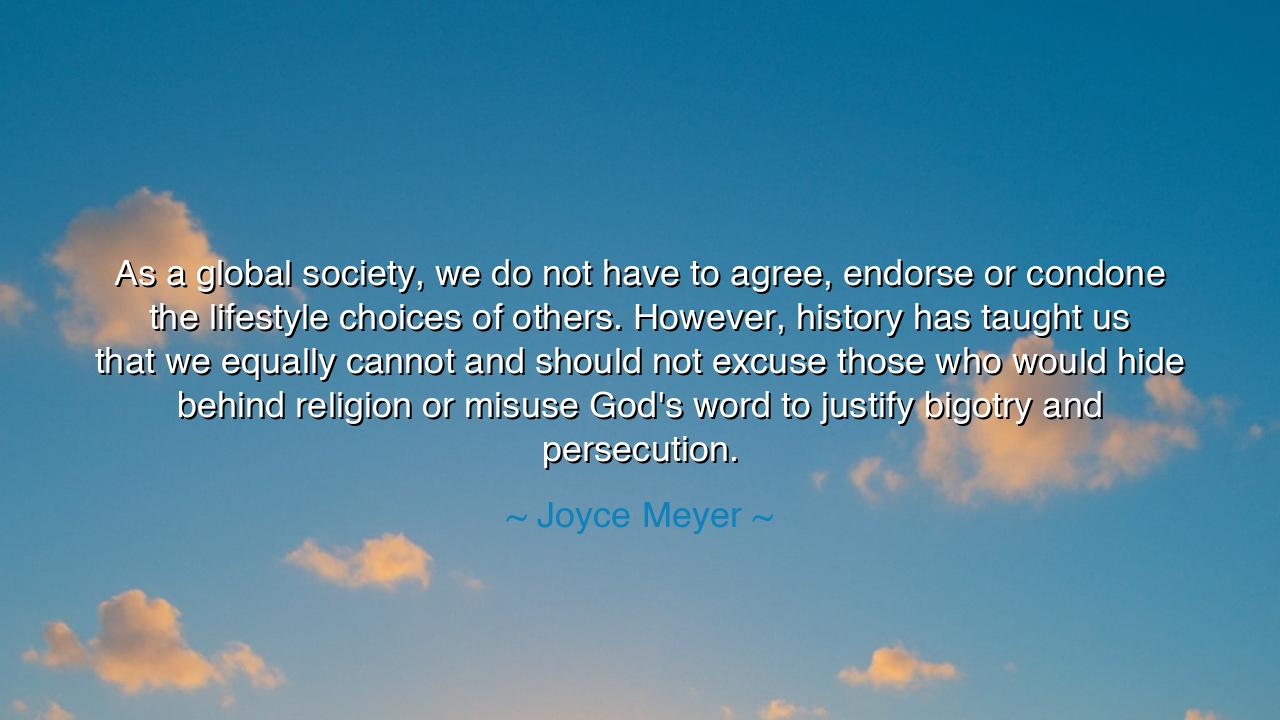
As a global society, we do not have to agree, endorse or condone
As a global society, we do not have to agree, endorse or condone the lifestyle choices of others. However, history has taught us that we equally cannot and should not excuse those who would hide behind religion or misuse God's word to justify bigotry and persecution.






“As a global society, we do not have to agree, endorse or condone the lifestyle choices of others. However, history has taught us that we equally cannot and should not excuse those who would hide behind religion or misuse God's word to justify bigotry and persecution.” — Joyce Meyer
Thus spoke Joyce Meyer, a teacher of faith and wisdom, whose words reach beyond doctrine and into the heart of morality. In this declaration, she calls humanity to an ancient balance — between conviction and compassion, between belief and justice. Her statement is a beacon for a divided world, reminding us that while we may not always walk the same path, we are bound by the same truth: that love, not judgment, is the heart of divine law. For when Meyer says we need not “agree, endorse, or condone,” she affirms freedom of conscience; but when she warns against those who “hide behind religion,” she reminds us that faith without mercy becomes tyranny.
The origin of her words lies in the long, often painful history of religion misused for oppression. From the Inquisition to slavery, from the persecution of heretics to the silencing of women and minorities, humankind has too often twisted the sacred to serve pride and power. Meyer, who has lived through struggle and transformation, speaks with the clarity of one who knows the weight of both faith and hypocrisy. She calls us to remember that the divine word is not a weapon but a light — meant to guide, not to wound. Her wisdom rises from the same truth spoken by prophets and sages before her: that righteousness cannot coexist with hatred, and that to use the name of God to justify cruelty is to profane the very God one claims to serve.
Throughout the ages, the misuse of religion has cast dark shadows upon human progress. Consider the tragic chapter of the Salem witch trials. In that time, fear clothed itself in piety. Neighbors turned against neighbors, convinced that they were purging evil in God’s name. Yet history revealed that their zeal was not divine, but driven by ignorance, fear, and pride. The scriptures they quoted were not wrong — but their hearts were. In their blindness, they forgot the higher commandment: to love one another. Meyer’s words echo across that same history, urging us to never again confuse righteousness with cruelty, or piety with persecution.
And yet, her teaching does not call for blindness or moral compromise. “We do not have to agree,” she says — for true tolerance does not require surrendering conviction. To love someone does not mean to approve of all they do; it means to see their humanity beyond their choices. Meyer’s balance is profound: it is possible to hold one’s beliefs firmly while still refusing to harm, judge, or condemn others. This is the discipline of compassion, a higher form of wisdom that transcends the rigidity of self-righteousness. It demands strength, humility, and faith — not in our perfection, but in the possibility of redemption for all.
We may look also to the example of Martin Luther King Jr., who confronted those who used Christianity to defend segregation. He, too, saw how easily the sacred word could be corrupted by fear and prejudice. Yet he did not abandon faith; he reclaimed it. “Let us not seek to satisfy our thirst for freedom by drinking from the cup of bitterness and hatred,” he said. Like Meyer, King understood that religion must lift mankind upward, not drive it apart. Both voices speak across generations to remind us that the test of true belief is not in how we defend our doctrines, but in how we treat the people who disagree with them.
Meyer’s words are a challenge to every soul: to look inward and ask, Do I use my faith to heal or to harm? The scriptures of the world, though differing in form, all teach mercy — yet it is human pride that turns them into instruments of division. The ancient teachers knew that the first sin of man was not disobedience but arrogance — the belief that one can claim divine authority while despising one’s brother. To “hide behind religion,” as Meyer warns, is to place a mask upon the face of God. The wise, therefore, seek humility — for the divine speaks not through condemnation, but through love and understanding.
So, O children of faith and seekers of truth, take this teaching as your compass: believe deeply, but love more deeply still. Stand firm in your convictions, but let mercy temper your judgment. When you encounter those who differ from you — in creed, in choice, in path — do not see enemies, but fellow travelers upon the same earth. Remember that faith is not proven by who we exclude, but by who we embrace. And when others misuse the sacred to justify cruelty, have the courage to speak, as Joyce Meyer did, against the falsehood cloaked in holiness.
For in the end, history has taught — and will continue to teach — that bigotry disguised as faith cannot endure. It may rise with fury, but it always falls beneath the weight of truth. Only compassion lasts. Only understanding heals. Only love, the truest reflection of God’s word, will echo through the ages as the enduring law of heaven and earth.






AAdministratorAdministrator
Welcome, honored guests. Please leave a comment, we will respond soon